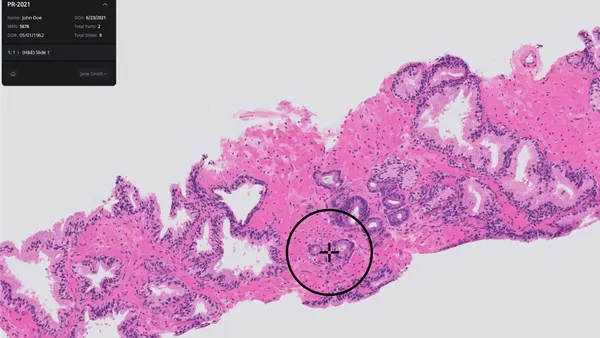Dive Brief:
-
LabCorp has posted a 1.2% decline in organic diagnostic volumes in the second quarter, contributing to a 2.9% dip in revenue at the company's diagnostic unit.
-
The downward trend, which contrasts to volume growth in the most recent quarterly report from arch rival Quest, was driven by lower demand for consumer genetics tests due to competition by 23andMe and changes to managed care contracts.
-
Loss of exclusivity with organizations including UnitedHealthcare and Horizon Blue Cross Blue Shield of New Jersey is impacting LabCorp but the company said volumes from the payers' customers are "holding stable."
Dive Insight:
LabCorp pulled in sales of $2.88 billion in the quarter, just missing the $2.90 billion consensus analyst forecast put together by Zacks. A mix of acquisitions and organic growth ensured sales were up very slightly over the prior period, although the positive performance was driven primarily by LabCorp's drug development division, not its diagnostics unit.
Sales at the diagnostics unit fell 2.9% in the second quarter. The decline is mainly attributable to the disposition of businesses but also reflects challenges facing LabCorp's continuing operations. Sales fell 0.3% on an organic basis, in part because of the Protecting Access to Medicare Act.
PAMA is far from the only problem facing LabCorp, though. Requisition volumes fell 0.9%, despite the positive effect of acquisitions. On an organic basis, volumes were down 1.2%. LabCorp's main rival, Quest Diagnostics, reported organic requisition volume growth of 2.6% in its financial results earlier this week.
The emergence of Quest as a competitor for UnitedHealthcare and Horizon Blue Cross Blue Shield of New Jersey business is an obvious possible cause for the declining volumes. LabCorp CEO David King told investors the headwind created by the contract changes was "not materially different" to the 0.7% seen in the first quarter. King described volumes from the customers as "holding stable."
LabCorp's problem is that the contract changes were not the only headwind. Rather, volumes also suffered as a result of falling demand at the consumer genetics business, which has caused LabCorp problems in the recent past.
"[Consumer genetics] volume for the second quarter was down about 1.1% versus last year," King said. With 23andMe as LabCorp's main customer, King said it is a "fair inference" to identify the consumer genetics company as the cause of the volume decline. LabCorp expects consumer genetic volumes to be flat or down over the rest of the year.
Away from the volume dip, the requisition results featured a more upbeat data point. Despite a 1.5% drag from PAMA, revenue per requisition rose 1.0%. The rise contrasts to the 2.3% drop in revenue per requisition suffered by Quest. LabCorp attributed the rise to a change in the test mix.
Yet, the rising revenue per requisition was too slight to boost LabCorp's profits. Adjusted operating income fell $30.6 million. LabCorp blamed PAMA for $27.1 million of the decline. Cybersecurity costs were another driver.
Despite the problems faced by the diagnostic unit, LabCorp improved its full-year revenue forecast on the back of the second quarter results. Management now expects diagnostic sales to fall 2% to 3% this year, as compared to a 2% to 4% decline when it originally set the outlook.
LabCorp released its results days after revealing expansion of its consumer-initiated testing service, Pixel. The expansion connects Pixel to LabCorp's patient service centers. Rather than provide samples at home using self-collection devices provided by LabCorp, customers can now visit one of nearly 2,000 centers to have a phlebotomist take the required specimen.
Involving PSCs in the Pixel service has enabled LabCorp to expand its test menu. After the expansion, LabCorp offers at-home test kits related to colorectal cancer, diabetes and lipids. The lab-based menu has 25 packages that contain around 90 individual tests.
LabCorp's stock was down more than 4% in early morning trading.













